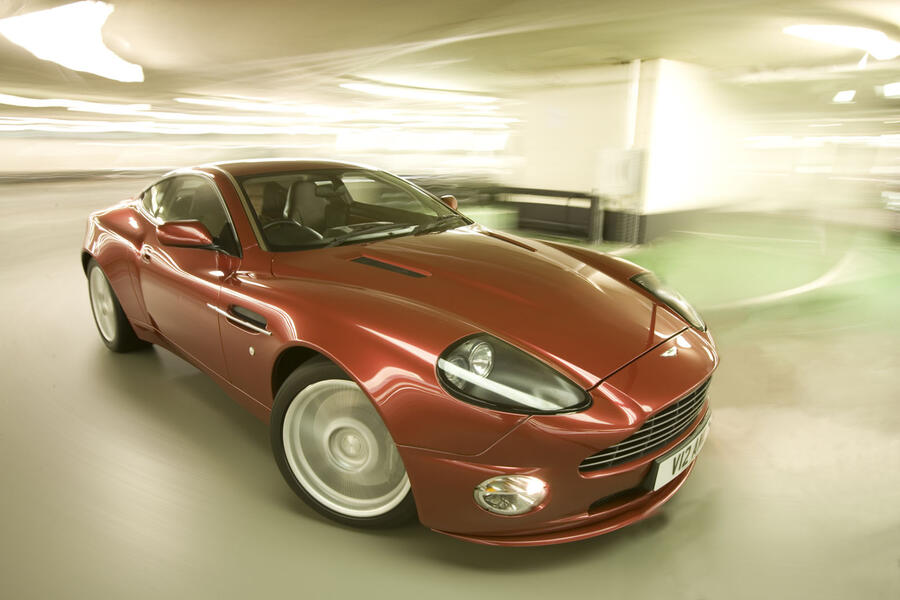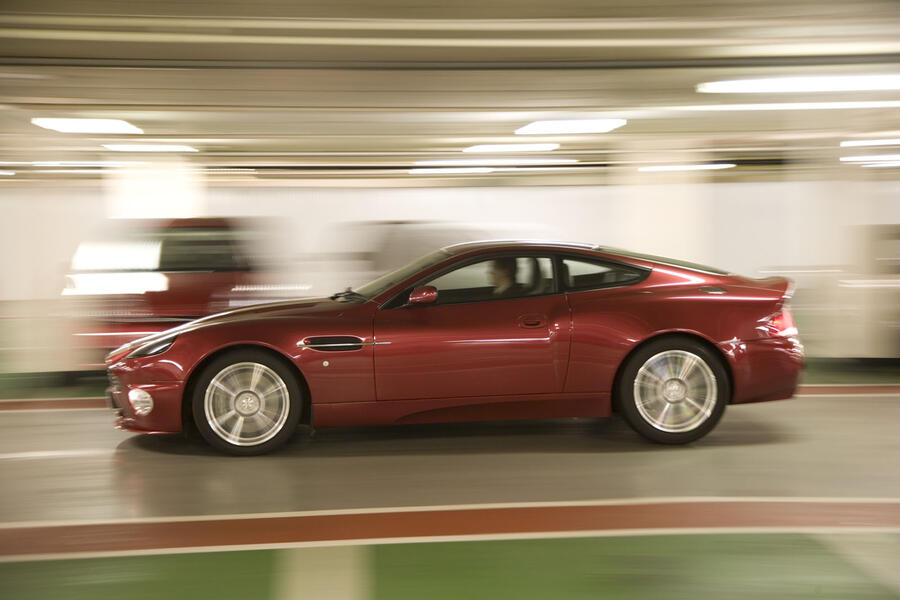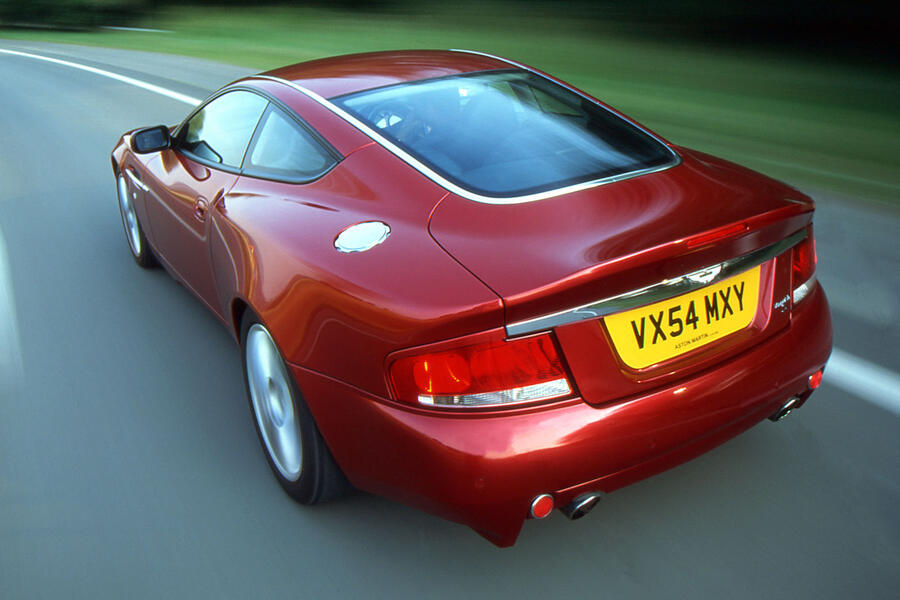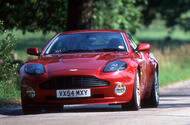The Aston Martin Vanquish is back, so we’ve revisited the original to find out what it’s got to live up to
The new Aston Martin Vanquish has been revealed, bringing the British brand’s V12-engined flagship back to the fore after a six-year hiatus.
With a whopping 824bhp and 738lb ft of torque, plus a stiffer chassis than its DBS predecessor, it’s poised to fight for the super grand tourer crown.
But it’s not all about measurable qualities. Sometimes, sheer charm alone is enough for a car to work its way into a hearts – which was very much the case with the Mk1 Vanquish.
As a reminder of that car’s charisma, here’s an extract from when we drove a Vanquish S across Europe in 2005, charting Aston’s then-ongoing revolution.
You can read the full feature in the Autocar Archive, where you can search and read through 129 years of the weekly magazine at the click of a button.
Sign up to the archive here

26 July 2005: Slower than an Evo. Uncomfy to drive. Ancient switchgear. I love it.
There are many ways of detecting greatness in a car, but none quite so reliable as its appearance after 500 hard and fast miles on the road. If you climb out, take one look at its mud-spattered flanks and bug-splattered nose and start casting around for a car wash, I’m afraid that while your car may or may not be any good, it is most certainly not great. But if the sight of several thousand examples of the local fauna rendered two-dimensional by the apocalyptic introduction of your car to their backsides makes you relive every last glorious mile, believe me, you have a true great on your hands.
Some cars just look better this way. And however good you may think Aston’s Vanquish S looks polished to within a millimetre of its primer on a show stand, it is as nothing compared to how it looks after several hundred miles of high-speed European exercise. The hours of accumulated crap add purpose and context to what is otherwise mere beauty, to create a sight much more stirring than when it started.
Our start was in Newport Pagnell. The association of this place with Aston Martin is extraordinary, with even the road signs proclaiming it to be ‘the home of Aston Martin.’ But it’s not where Aston Martin started life (Feltham) nor where most have been built (Bloxham) nor even where the HQ is today (Gaydon). Yet we all consider Newport as the marque’s true home.
Our purpose was to take a Vanquish – the only car still built in Newport – and drive to Cologne where, in a very small corner of a very large Ford plant, all of Aston Martin’s engine production now takes place. Having produced Astons non-stop since 1959, the Vanquish will be the last to be built in Newport Pagnell and, as I drove north from London to meet it, I wondered what former chairmen like David Brown and Victor Gauntlett would have felt about such a large part of Aston’s soul now being built by the Germans.

It was great to go back. The new factory at Gaydon is magnificent but you won’t find men hitting sheets of aluminium with hammers. There are no ancient lathes or workers with pencils behind their ears, but they’re still at Newport. We even managed to unearth a prototype for the DB4, the first car to go into series production there.
Those I spoke to seemed worried that the facility would be sold when legislation outlaws the Vanquish in 2008, but I have been told there are no such plans. Aston Martin is growing a service and restoration business at the old factory, where the craftsmanship can still be put to good use, so it is to be hoped that this will ensure its survival long into the future.
For now, though, I had to get to know the Vanquish again. Reacquainting yourself with such a car is like meeting an old school friend: within 10 minutes he or she will have annoyed you so much you wonder why you bothered. But as you ease into each other’s company once more, so it becomes clear that the magic that sparked your relationship is still there.
Still, the Aston tried my patience. It is ridiculous that a company owned by Ford can offer for sale a £174,000 car with a poor driving position, unsupportive seats, no cruise control, ancient Jaguar switchgear and a map-free satellite navigation system. I know why: Aston produces 350 Vanquishes each year and cannot justify the level of investment required to right these issues. But that doesn’t mean they don’t rankle. To make matters worse, I’d driven there in a £30k Mitsubishi Evo IX and, after that, the Aston didn’t even feel very fast.

I reached the coast in heavy traffic and unimproved humour, thoughts of how much more could be achieved with a Porsche 911 Carrera S and a hundred grand in the bank now resident in my head. I never was someone who could be romanced by the look of a car alone: if the hardware beneath can’t cash the cheque written by its appearance, what you have is not just a bad car, but a bad car that’s betrayed your trust.
Then again, I knew this car better than that. I’ve managed to find an excuse to drive one at least once a year since I wrote its first road test in 2001, and every one has done its best to make me hate it, and every one has failed. I was still confident the S, with its 520bhp motor, would be no different.
It is not difficult to find Cologne from Calais – it’s one of the least rewarding drives you can do. So, once I’d had my fill of autoroute and dodging Belgian police, we peeled off the motorway and swung south, drawn by the lure of Spa.
Aston Martin has no fabulous history at the legendary Ardennes circuit but the similarities between them commanded the visit. Both came into being in the early 1920s and made their names through both speed and beauty. Both were changed extensively in the 1980s but, despite being redefined for the modem era, both have managed to cling to the appeal that made them great in the first place.

Of course, the new circuit was busy, but for once I didn’t mind. I took to the old track, barrelled it through Stavelot fast enough for photographer Stan to shout at me and ate chips at the Masta Friterie, next to where Pedro Rodriguez and Jo Siffert would have had to persuade their Porsche 917s to change direction twice at over 180mph. The chips weren’t great but it hardly mattered. Sitting there, I was glad to have the Aston with me and not something of less noble stock. In places like this, it’s important to turn up in the right wheels.
Inevitably, I stayed too long and by the time the thrumming of [photographer Stan Papior’s] fingers on the table became unbearable, the light was fading fast. So, discovering the navigation system to be entirely useless, we set off cross-country to find both Germany and the true spirit of the Vanquish.
Click here to subscribe to the Autocar Archive and read the full feature
Source: Autocar
